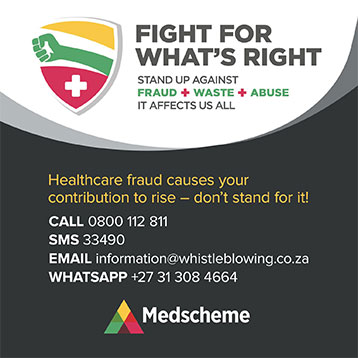News
TREATING HEALTHCARE FRAUD AND SAFEGUARDING SA'S HEALTHCARE - SHINES A LIGHT ON THE ALARMING EXTENT OF HEALTHCARE FRAUD, WASTE, AND ABUSE IN SOUTH AFRICA THIS INTERNATIONAL FRAUD AWARENESS WEEK.

For millions of South Africans, healthcare is among the top three expenses in our lives, trailing only food and shelter. In fact, the increases in healthcare costs are now at their highest rate since 2017. However, lurking beneath these rising costs is an uncomfortable truth – fraud, waste and abuse are significantly contributing to these high costs.
The Council for Medical Schemes (CMS) estimates annual losses of R22bn-R28bn due to these unnecessary costs, with up to 15% of healthcare claims tainted by these practices.
In response, medical scheme administrators like Medscheme, a subsidiary of the AfroCentric Group, are shining a spotlight this fraud awareness week to highlight the impact that Fraud, Waste and Abuse has on healthcare. With 3.9 million lives under our management, we process over R37bn in claims annually, whilst also ensuring that we exercise the responsibility that lies with our administration- to safeguard the quality of care for scheme members and the future of healthcare in South Africa.
To understand the impact of FWA we must first define what it is, to be able to effectively combat what schemes and medical administrators are confronted with.
Fraud in healthcare involves a deliberate attempt to deceive by manipulating facts with the intention of personal gain. While it's most commonly associated with financial motives, such as practitioners billing for services never provided, leading to a financial loss for the healthcare scheme, there's also the issue of waste. Waste pertains to the intentional overuse of services and resources, like ordering excessive medical tests without a valid medical basis. This drives up healthcare costs significantly as schemes have to cover these unnecessary claims. Additionally, abuse occurs when healthcare practitioners misuse medications through practices like overprescribing or sharing of medicines, posing health risks to patients and further escalating healthcare expenses.
On average, the Medscheme Forensics department investigates 300 cases per month for suspected FWA activity or behaviour. These cases come from tip-offs, referrals, and proactive flags identified using advanced detection tools. The adoption of machine learning and artificial intelligence to predict the risk of irregular claims, focusing on behavioural billing patterns are employed as a line of detection. From a prevention perspective, medical schemes take proactive steps, including rigorous claims management processes, regular audits, and whistleblowing mechanisms.
The impact of these crimes is real, and Medscheme Forensics employs advanced technology to investigate irregular claims. The computational power of Artificial Intelligence (AI) allows for the accelerated scoring of a significant volume of claims data within milliseconds, enabling the detection of anomalies for further investigation.
Irregular claims are submitted in many creative ways, and it is often hard to contain due to various factors, including the need for quick access to healthcare, the emotive nature of the story linked to every event, and abuse of oath that healthcare professionals are compelled to act in the best interest of the patient.
These incidents are not faceless numbers and statistics. They are real issues that can have devastating consequences for patients, medical schemes, and the healthcare industry.
By being mindful of our healthcare spending and ensuring that every expense is essential, we can help to improve the sustainability of healthcare systems while also ensuring that resources are being used effectively to improve patient outcomes.
As International Fraud Awareness Week emphasises, we all need to act and become fraud fighters. For businesses, especially those in healthcare, data sharing, analytics, and collaboration are key. For medical schemes, engaging members in the fight and validating services received from healthcare professionals can help weed out false claims from both members and healthcare professionals. By doing so, we can redirect resources to where they matter most – the health and well-being of all South Africans
Back to previous page

